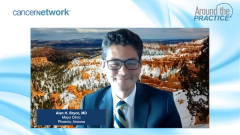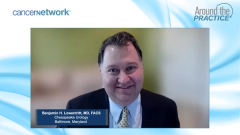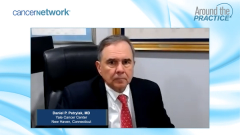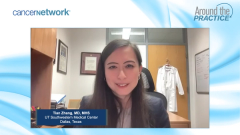
Future Directions in mHSPC Management: An Evolving Treatment Landscape
Key opinion leaders in the field of prostate cancer close out their discussion by sharing excitement for future evolutions in the setting of hormone-sensitive disease management.
Episodes in this series

Transcript:
Alan H. Bryce, MD: Let’s close with a couple of thoughts. One important point we need to make is, Dr. Zhang let’s ask you, with ADT [androgen deprivation therapy] monotherapy, where does that fit in anymore? Because we know from the real-world data that it’s still a significant proportion of patients, and we know from all the clinical trial data that ADT monotherapy yields shorter survival and lower quality of life. There’s a bit of a disconnect, but there’s still the appropriate patient. Where would you consider ADT monotherapy, and what proportion of the population is this?
Tian Zhang, MD, MHS: We’ve proven in many trials that even a doublet, any doublet, is better than ADT alone for patients with metastatic prostate cancer. In the high-risk, localized setting with maybe a PSMA [prostate-specific membrane antigen]–avid lymph node but not conventional imaging-proven metastatic disease, I’m still somewhat equivocal. Maybe ADT with radiation is sufficient. For a long time, that’s how we treated localized high-risk prostate cancer. I’m not too convinced that PSMA-positive lymph nodes on their own are going to intensify treatment early. I may come back to bite my words later. That’s OK, but that would be the only disease setting where ADT alone is standard. If somebody has tried 1 of these systemic therapies—abiraterone, enzalutamide, or apalutamide—and can’t tolerate them, those situations are where we would stop and do ADT on its own. Although it’s important to give patients an academic try at intensifying treatment, particularly if they have metastatic disease on conventional imaging.
Alan H. Bryce, MD: In my practice, I have a handful of patients on ADT monotherapy. It’s not 0. It’s a handful. One way or the other, the setup is the same. It’s that patient with a lot of comorbidities. You have multiple reasons to not want to do 1 of the oral agents or another. Prostate cancer aside, that patient’s other comorbidities dictate that their overall survival is less than 2 years. They have a limited survival from their heart disease, kidney disease, or something else. Maybe they have advanced Parkinson [disease]. It’s not an uncommon scenario, and I’m worried about muscle strength. In that scenario, all I’m trying to do is minimize the bone pain they’re having and the symptoms they’re having. Survival isn’t the goal, because frankly they’re not going to have long survival. That’s a patient on ADT monotherapy. What is that, 5% of patients or less? It’s a limited number. So I think doublet is the standard, unless there’s that clear comorbidity story to contraindicate the oral drugs.
Let’s wrap up with final thoughts. Dr Lowentritt, start from the top. We’ll let you go first. Where do you think we’re going with first-line treatment of mHSPC [metastatic hormone-sensitive prostate cancer]? Are there things on the horizon that you’re excited about?
Benjamin H. Lowentritt, MD, FACS: For mHSPC, we’re seeing how some of these agents can move earlier in specifically targeted populations. The conversation we just had is fantastic. Even though we’re successful with hormonal therapies, and they’ve been great in prostate cancer, anything that has a different mechanism, which we can potentially abbreviate or avoid some of those chronic hormonal therapy issues, is exciting to me. And we’re looking at lutetium or other radioligand therapies coming, looking at those in the earlier stage, looking at targeted therapies based on different biomarkers, not just PARPs. These are exciting times. We’ll see those start to blossom over the next 3 to 5 years. Although it’s not directly mHSPC, with the intensification of treatment with localized therapies, we’ll see those outcomes with PROTEUS, ATLAS, and some of the other high-risk, localized trials that should be showing results soon. This is all exciting.
Alan H. Bryce, MD: Dr Petrylak, what are you excited about in the future of mHSPC? Let me add another question. You’re at Yale [Cancer Center]. You’ve got all of New England north of you, with a lot of patients from rural areas. What advice do you have for collaborating community physicians whose patients live far from the cancer center?
Daniel P. Petrylak, MD: The important thing is that about half our patients are receiving next-generation androgens, let alone triplet therapy. Every patient needs to have at least doublet therapy offered to them. Whether they receive chemotherapy or not is going to be related to the disease characteristics and the patient’s ability to travel to see their physician. At minimum, they should be offered next-generation sequencing and these novel agents because across the country, we’re not seeing the uptick that we should be seeing with this. That’s what I would say to the people in the rural areas.
Alan H. Bryce, MD: Dr Zhang, final thoughts?
Tian Zhang, MD, MHS: I’ll put in a plug to at least send genetic testing while we can, especially for patients with metastatic disease or even in the high-risk localized setting. According to the guidelines, it’s important to test these folks and find the 10% to 15% who might have actionable mutations and alterations. If we don’t test, we won’t find them. As we have more life-extending therapies, our patients are living longer. I’m glad to be here for it and to have that continuity of practice with these patients with prostate cancer.
Alan H. Bryce, MD: Thank you to our faculty for joining us for this lively discussion in the treatment of patients with mHSPC, brought to you by CancerNetwork®. Thank you to our viewing audience as well. We hope you found this discussion to be informative and beneficial to your clinical practice. Thanks very much. We’ll see you next time.
Transcript edited for clarity.
Newsletter
Stay up to date on recent advances in the multidisciplinary approach to cancer.












































